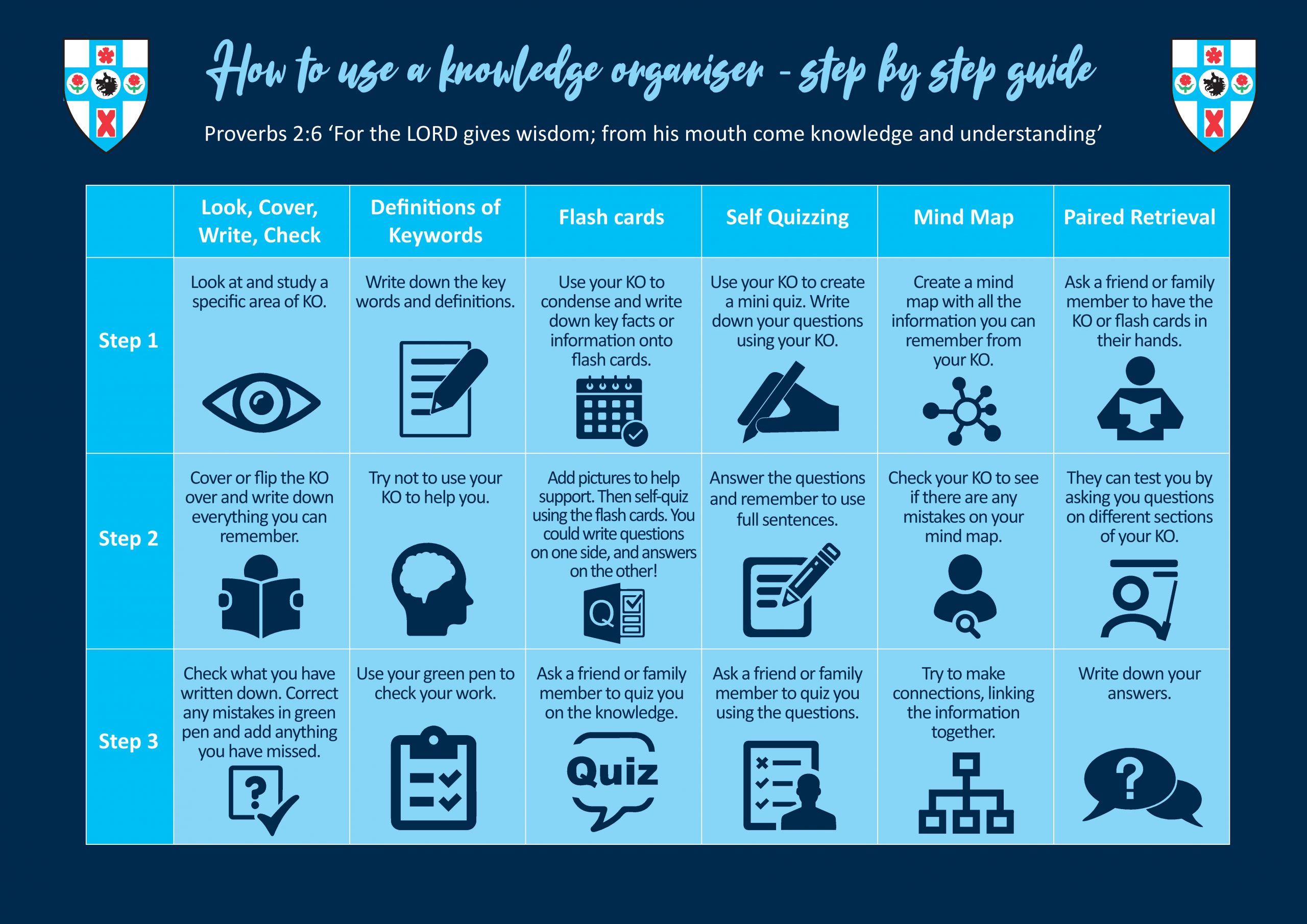Principal’s Message
At St Edmund’s Catholic Academy we want our self- developed knowledge organisers to be at the centre of everything we do in the classroom. Identifying core knowledge and being explicit about this knowledge with students and parents will allow us to create clarity and a foundation on which wider knowledge and skills can be built. Every subject has a knowledge organiser for each unit covered for every term and this is shared with parents, staff and students with a step by step user guide giving a range of revision strategies they can apply to recap and revisit what they have learnt in lessons. This will enable each student at the Academy to move their knowledge from their short- term memory to their long- term memory making them more prepared for their GCSEs and beyond. We would like to take this opportunity to wish you the best of luck with your future endeavors.
What is a knowledge organiser?
A knowledge organiser lists the important key facts or information– not practical skills – that students should know and be able to recall in order to master a topic by the end of a unit of knowledge. We still believe that skills are important, but knowledge is the starting point to then allow students to use this knowledge in the application of skills.
A knowledge organiser should be used as;
- A planning tool to clearly outline the core knowledge that should be taught.
- A quizzing tool to help students boost their recall of key knowledge.
- A tool to be used for both home learning and within a classroom.
Why are we using knowledge organisers?
GCSEs and vocational courses are becoming increasingly challenging. The focus of these exams is now based on knowledge retrieval and application of knowledge. This puts increasing pressure on students to know and retain even more information for longer.
Typically, most youngsters leave their revision until a few weeks (best case scenario) or days/hours (worst case scenario) before the examinations and tests. This presents a problem. Our short-term memory is designed to be just that, short-term, and has limited capacity. Students find themselves unable to retain the information, they become stressed and often give up, convincing themselves they are no good at revising or that they “can’t do subject ‘x’”.
The secret to success is to regularly revisit the knowledge to be learned. This helps transfer the knowledge from the short-term memory to the long-term memory. This not only helps to make ‘learning stick’ but it also frees up our short-term memory for day-to-day learning and experiences.
How can I access a knowledge organiser?
Each subject area has created a knowledge organiser for the topics you will cover over the year.
They can be accessed on our school website here.
In the interest of sustainability please save them in your google drive and use them regularly as part of your homework schedule. However, if you do prefer a printed copy please contact your HOY who will happily provide one to you.
It is really important that you keep all of your knowledge organisers somewhere safe, because the knowledge required in Year 7 will also be needed in Years 8-18 as part of the enriched curriculum available at St Edmund’s Catholic Academy.
How do you use a knowledge organiser?
One of the reasons for the introduction of knowledge organisers is to ensure that our students understand the different methods of revision. Through homework, students will begin a 5/7 year revision programme ensuring that they are better prepared by the time they get to Year 11 and 13. We have identified the following revision strategies in a step by step guide, providing us with a useful source of meaningful homework activities to apply to each student to support them continuously throughout their academic life. This means that they continuously have the opportunity to embed their knowledge and improve their understanding of each topic in every subject area at the Academy. This will allow each student to take greater responsibility for their own learning and work on ‘closing the gaps’ in their own knowledge at home. If these key facts have been learnt, there will be less of a burden on a students’ working memory making it more likely they will learn to apply those facts when solving problems in lessons. These will also form part of spaced knowledge retrieval practice, by systematically recalling information that we wish to be learnt which is far more effective to become part of students long term memory.

Other ways in which students can self test and study
Students can use their Knowledge Organisers in a number of different ways but should not just copy from the Knowledge Organiser into their book.
- Ask someone to write questions for them
- Write their own challenging questions and then leave it overnight to answer them the next day
- Create mind maps / Create flashcards
- Put the key words into new sentences
- Look, cover, write and check
- Mnemonics
- Draw a comic strip of a timeline / Draw diagrams of processes / Draw images and annotate/label them with extra information
- Use the ‘clock’ template to divide the information into smaller sections. Then test themselves on different sections.
- Give themselves spelling tests / Definition tests
- Do further research on the topic
- Create fact files / Create flowcharts
How do knowledge organisers help parents/carers?
By producing knowledge organisers for each term parents/ guardians will have a better understanding of what students are learning in each subject area. They will allow parents to build on their knowledge at home and provide an easy tool for parents to quiz children at home (and children to quiz parents!)
We have developed our own Knowledge Organisers to support the delivery of the curriculum which contain a list of technical vocabulary with definitions, useful diagrams and timelines. These knowledge organisers are designed carefully to match identified key knowledge, vocabulary and skills we want each class to understand in each of our topics.
Many of you ask us how you can help to support your children at home. Some of you are worried that you don’t have all of the subject specific knowledge to be able to help your children. Some of you worry how to check that your children have done their work and revision. The knowledge organisers will help you to do this easily.

